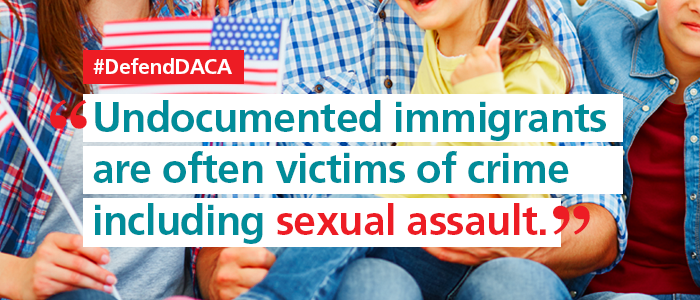Earlier this month, the U.S. Attorney General announced the end of DACA and gave Congress six months to pass immigration reform legislation. Following that announcement, bipartisan plans to protect DACA emerged. However, it remains uncertain what the future will be for the thousands of individuals protected by DACA. Without the passage of immigration reform legislation, DACA recipients could face deportation to countries they have never been to and communities struggling with poverty and violence.
The announcement to end DACA is the latest in an overall federal crackdown on immigrant communities and those who provide them sanctuary. These decisions are in part, driven by a “tough-on-crime” ideology. However, it should also be noted that over a century of studies have shown that most violent crimes in the U.S. are committed by native-born citizens—not immigrants. These policy decisions do not necessarily make our communities safer. In fact, they have many concerning ramifications on all of us including the increased risk of sexual assault.
Approximately 800,000 individuals have benefitted from the Deferred Action for Childhood Arrivals (DACA) program since it began in 2012. DACA participants are young, undocumented immigrants who were brought to the U.S. as children and have grown up in communities throughout the U.S.—contributing to the strengths of our neighborhoods, schools, workplaces, military, and tax base.
DACA participants are often called “DREAMers” mainly because of the proposed DREAM Act, (Development, Relief, and Education for Alien Minors), which would afford the opportunity of citizenship to young people who were brought to the U.S. as children. While the DREAM Act has not yet passed, with DACA’s protections, DREAMers have been able to come out of the shadows and attend college, work, and serve in the military to protect the country they consider their own.
Dreamers are like many others in the U.S. who have in the past and continue today to pursue the illusive “American Dream”—with the belief and drive that with hard work, no matter your start in life, you will reap success in this land of opportunity.
But undocumented immigrants often struggle as victims of crime, including sexual assault.
Fear of deportation is one of the most significant reporting barriers for sexual assault victims without legal residency. Many communities (such as “Sanctuary Cities”) encourage the reporting of all crimes, regardless of immigration status, to enhance public safety and ensure that individuals committing crimes are held responsible. However, in the current national landscape of increased restrictions and penalties against immigrant communities and Sanctuary Cities, it is not surprising that immigrant sexual assault and domestic violence victims are afraid to report the crimes that have been committed against them.
They must weigh the possible benefits of reporting against the very real threat of being deported. This is a decision victims should never have to face.
A decline in crime reporting means victims of sexual violence do not receive critical services and criminal behaviors go unaddressed. This affects us all. Our safety and well-being is intricately connected to the safety and well-being of each other, regardless of citizenship status. A rescinding of DACA only serves to intensify these barriers.
PCAR opposes rescinding DACA, as it is at odds with our mission to eliminate sexual violence and advocate for the rights and needs of sexual assault victims. The decision to rescind DACA conflicts with our core values and commitment to racial justice and undermines victims’ and the public’s overall safety.
Please join us in taking important steps to support the safety and security of DREAMers.
We can all make our voices heard, by contacting our legislative representatives in Congress and in our state legislatures and asking for their support for DACA and the bipartisan DREAM Act.
We are grateful for the work of the Pennsylvania Immigration Resource Center, where advocates and survivors can find assistance in navigating their rights and resources.

